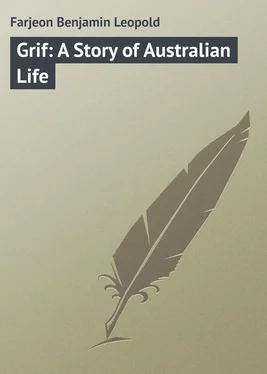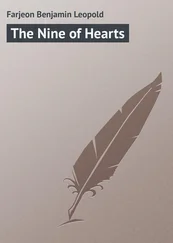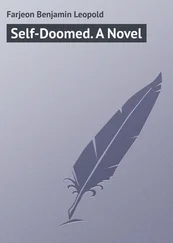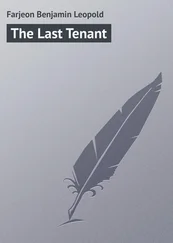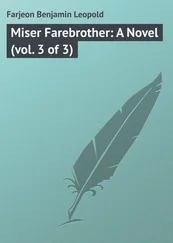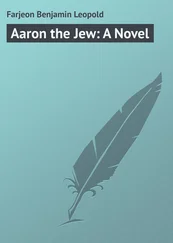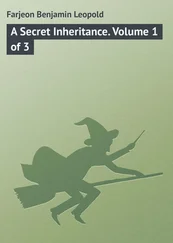Benjamin Farjeon - Grif - A Story of Australian Life
Здесь есть возможность читать онлайн «Benjamin Farjeon - Grif - A Story of Australian Life» — ознакомительный отрывок электронной книги совершенно бесплатно, а после прочтения отрывка купить полную версию. В некоторых случаях можно слушать аудио, скачать через торрент в формате fb2 и присутствует краткое содержание. Жанр: foreign_prose, на английском языке. Описание произведения, (предисловие) а так же отзывы посетителей доступны на портале библиотеки ЛибКат.
- Название:Grif: A Story of Australian Life
- Автор:
- Жанр:
- Год:неизвестен
- ISBN:нет данных
- Рейтинг книги:3 / 5. Голосов: 1
-
Избранное:Добавить в избранное
- Отзывы:
-
Ваша оценка:
- 60
- 1
- 2
- 3
- 4
- 5
Grif: A Story of Australian Life: краткое содержание, описание и аннотация
Предлагаем к чтению аннотацию, описание, краткое содержание или предисловие (зависит от того, что написал сам автор книги «Grif: A Story of Australian Life»). Если вы не нашли необходимую информацию о книге — напишите в комментариях, мы постараемся отыскать её.
Grif: A Story of Australian Life — читать онлайн ознакомительный отрывок
Ниже представлен текст книги, разбитый по страницам. Система сохранения места последней прочитанной страницы, позволяет с удобством читать онлайн бесплатно книгу «Grif: A Story of Australian Life», без необходимости каждый раз заново искать на чём Вы остановились. Поставьте закладку, и сможете в любой момент перейти на страницу, на которой закончили чтение.
Интервал:
Закладка:
"Rough! Rough!" cried Grif, drawing the dog out of the barrel. "What's the matter, Rough? Are you hurt?" He felt all over its body, but could discover nothing to account for Rough's distress. He took his faithful servant in his arms, and looked at it by the dim light of the weeping stars. Rough opened its eyes and looked gratefully at Grif, who pressed the dog to his breast, and strove to control the violent shuddering of its limbs; but its agony was too powerful. It rolled out of Grif's arms on to the ground, where it lay motionless.
Cold and wet and shivering as he was, a deeper chill struck upon Grif's heart as he gazed at the quiet form at his feet. He called the dog by name, but it did not respond; he walked away a few steps and whistled, but it did not follow; he came back, and stooping, patted it upon its head, but it did not move; he whispered to it, "Rough! poor old Rough! dear old Rough! speak to me, Rough!" but the dog uttered no sound. Then Grif sitting down, took Rough in his arms, and began to cry. Quietly and softly at first.
"What did Ally arks me to-night?" he half thought and half spoke between his sobs. "Did I ever have a friend that I would sacrifice myself for? Yes! I would for Rough! There wasn't another dawg in Melbourne to come up to him! And now he's gone, and I ain't got no friend left but Ally." And he laid his face upon the dog's wet coat, and rained warm tears upon it.
"After all the games we've had together!" he continued. "After the times he's stood up for me! He'll never stand up for me agin-never agin!"
He knew that the dog was dead, and his anguish at the loss of his dumb, faithful friend was very keen. Had it been human, he could not have felt a deeper affliction.
"Everybody liked Rough! And he never had a growl for no one who spoke kind to him. Everybody liked him-everybody except the Tenderhearted Oysterman. The Tenderhearted Oysterman!" he cried, jumping to his feet as if an inspiration had fallen upon him. "Why, it was him as swore he would murder Rough! It was him as passed to-night when I was goin' to give Rough the pie! It was him as give Rough the piece of meat! The piece of meat! It was pizened! He swore he'd kill him, and he's done it! That's what I heerd him laughin' at."
Grif wiped the tears from his eyes with the cuff of his ragged jacket, and clenched his teeth.
"He's pizened Rough, has he?" he muttered, gloomily; and raising his hand to the dark sky, he said, "If ever I can be even with him for killin' my dawg, I will, so 'elp me-"
This time there was no one by to check the oath, and he uttered it savagely and emphatically. Then he put his head in the barrel, and shook Little Peter awake.
"Peter," he said, "Rough's dead. Ain't you sorry?"
"Yes," said Little Peter, without any show of feeling.
"He's been pizened. The Tenderhearted Oysterman's pizened him. Say Damn him!"
"Damn him!" Little Peter said, readily.
"I'm going to bury him," said Grif. "Git up and come along with me."
Very obediently, but very sleepily, Little Peter came out of bed. Grif looked about him, picked up a piece of rusty iron, and taking Rough in his arms, walked away, and Little Peter, rubbing his eyes, trudged sometimes behind and sometimes at Grif's side. Now and then the little fellow placed his hand half carelessly and half caressingly upon Rough's head, and now and then Grif stopped and kissed his dead servant. In this way, slouching through the miserable streets, the rain pouring heavily down, the funeral procession reached a large burial-ground. The gates were closed, but they got in over a low wall at the back. Everything about him was very solemn, very mournful, and very dreary. The night was so dark that they could scarcely see, and they stumbled over many a little mound of earth as they crept along.
"This'll do," said Grif, stopping at a spot where a tangle of grass leaves were soiling their crowns in the muddy earth.
With the piece of iron he soon scraped a hole large enough for the body. Some notion that he was performing a sacred duty which demanded sacred observances was upon him.
"Take off your cap," he said to Little Peter.
Little Peter pulled off his cap; Grif did so likewise; and the rain pattered down upon their bare heads. They stood so for a little while in silence.
"Ashes to ashes!" Grif said, placing the body in the hole, and piling the earth over it. He had followed many funerals to the churchyard, and had heard the ministers speak those words.
"Good-bye, Rough!" murmured Grif, with a sob of grief. "Dear old Rough! Poor old Rough!"
And then the two outcasts crept back again, through the dreary streets, to their bed in the barrel.
CHAPTER IV.
THE CONJUGAL NUTTALLS
The March of Progress is sounding loudly in the ears of the people who throng the streets of Melbourne. It is not a lazy hum, a droning whisper, with an invitation to sleep in its every note; there is something martial in its tones, something that tells you to look alive and move along, if you do not wish to be pushed into a corner and lost sight of. It may be that the March of Progress is set to quicker time in the busy thoroughfares of Melbourne than in those of the cities of the older world. It makes itself more strongly felt; it asserts itself more independently; it sets the blood in more rapid circulation. It carries us along with it, past noble-looking stores filled with the triumphs of the workshops of the world which emigrants call Old; past great hotels whence men issue in the noonday light, wiping their months unblushingly, and through the swinging doors of which you catch glimpses of excited men, eating, drinking, talking, gesticulating, as rapidly and fiercely as if they thirsted to trip up the heels of Time, and take him prisoner by the forelock; past fine houses and squalid houses; through quarters where wealth smiles and poverty groans; to the very verge of the growing city, from which line the houses dot the landscape pleasantly, and do not crowd it uncomfortably-from which line are seen fair plains and fields, and shadows of primeval forests in the clouds. And here, the air which had been swelling louder and louder, until it grew into a clanging sound that banished all sense of rest, grows fainter and sweeter; here in the suburbs, as you walk in them by the side of the whispering river, over whose bosom the weeping willow hangs, the March of Progress subsides into a hymn, which travels on through the landscape to the primeval forests, and softly sings, that soon-where now grim members of the eucalypti rear their lofty heads; where now a blight is heavy on the bush, which before the burning sun had waged fierce war with it and sucked the juices from the earth, was bright and beautiful with tree and flower-the golden corn shall wave, and gladden the face of nature with rippling smiles.
The March of Progress sounds but faintly before a prettily-built weatherboard cottage in the suburbs, where dwell the family of the Nuttalls. It is a pleasant cottage, and so Mr. Nicholas Nuttall seems to think as he looks round the parlour with a smile, and then looks down again, and reads, for at least the sixth time, a letter which is lying open on the table.
"And Matthew is alive," he said, speaking to the letter as if it were sentient; "alive and prosperous! To think that it should be thirty years since I saw him; that I should come out here, scarcely hoping to find him alive, and that, after being here only a month, I should hear of him in such a wonderful manner. So amazingly rich, too! Upon my word," he continued, apostrophising a figure of Time, which, with a very long beard and a very long scythe, looked down upon him from the family mantel-shelf; "upon my word, old daddy, you're a wonder. You are," he continued, shaking his head at the figure; "there's no getting over you! You grow us up, you mow us down; you turn our hair black, you turn it white; you make us strong, you make us feeble; and we laugh at you and wheeze at you, until the day comes when we can laugh and wheeze no more. Dear! dear! dear! What a handsome fellow he was to be sure! I wonder if he is much altered. I wonder if he ever thinks of old times. I shall know him again, for certain, directly I clap eyes on him. He must have got grey by this time, though. Dear! dear! dear!"
Читать дальшеИнтервал:
Закладка:
Похожие книги на «Grif: A Story of Australian Life»
Представляем Вашему вниманию похожие книги на «Grif: A Story of Australian Life» списком для выбора. Мы отобрали схожую по названию и смыслу литературу в надежде предоставить читателям больше вариантов отыскать новые, интересные, ещё непрочитанные произведения.
Обсуждение, отзывы о книге «Grif: A Story of Australian Life» и просто собственные мнения читателей. Оставьте ваши комментарии, напишите, что Вы думаете о произведении, его смысле или главных героях. Укажите что конкретно понравилось, а что нет, и почему Вы так считаете.
